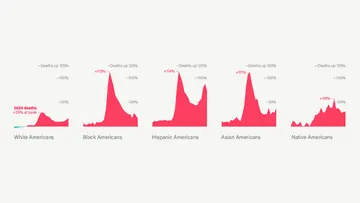1. Life sentences don’t necessarily mean life.
Unless they're sentenced to life without parole, people serving life sentences are eligible for parole eventually. The minimum date by which they can go before the parole board varies by state: in some states it's as little as 15 years; in other states it's as many as 50.
2. But most parole boards won’t even think about giving parole to lifers.
Research shows violent offenders are the least likely to reoffend, but parole-eligible lifers are almost never paroled at their first hearing, and in some states are never paroled at all. This refusal to grant parole to lifers "has obliterated the distinction" between life with and life without parole, wrote Maryland Circuit Court Judge Philip Caroom in a recent report.
3. If you are a farmer, auto salesman, DuPont executive or personal fitness trainer, you too can be on a parole board.
Most states don’t require experience with the criminal justice system to be on a parole board. Only some states have basic professional and educational requirements for parole board members — and those that do are usually worded in an advisory way, like, "board members should have a bachelor's degree."
4. Prisoners have no legal rights in parole hearings.
In all other aspects of the criminal justice system, people have some basic rights guaranteed by the Constitution, like the right to confront your accuser or to see the evidence against you. But according to the Courts, parole is an "act of grace," not a right — so prisoners have no protections.
5. Parole boards can make decisions for almost any reason.
Courts let parole boards make decisions on the basis of anything they want. Some boards have decision guidelines, but there's little in the law that requires board members to follow them.
6. Parole is not "early release."
Many refer to parole as "early release," but the possibility of parole is built into the sentence when the judge hands it down. Judges hand down a range of years, like five-to-10 or two-to-seven. After serving the minimum number of years — or “min” — inmates are eligible for parole. “The public says, ‘They’re letting them out early!’ That’s what really frosted me,” says Donna Sytek, chair of the New Hampshire board. “Nobody gets out early! Everybody serves their minimum.”
7. No one really knows how to get parole.
Boards rarely set clear expectations for what an inmate must do to earn release. When they do, they’re not required to keep their own promises. "Last time I saw the board, in '94, they said, stay ticket-free, and we’ll interview you in five years," says Reynaldo Rodriguez, who is serving a life sentence in Michigan for second-degree murder. Since his conviction in 1977, he has twice been denied by the state's parole board. "I got no tickets. What did I do in these last five years that I didn’t deserve an interview?"
8. Parole boards can dictate your life on the outside, too.
Parole boards don't just decide who to send home. They also decide what the conditions of people's parole will be, and what the consequences are if they violate parole. In some states, boards can even decide whom to consider for parole and when.
9. Parole boards may not actually meet the person up for parole.
In many states, boards can make the decision based solely on the records in the prisoner’s file. Considering an average state board has about 35 release decisions per workday, that’s not a lot of time for review.
